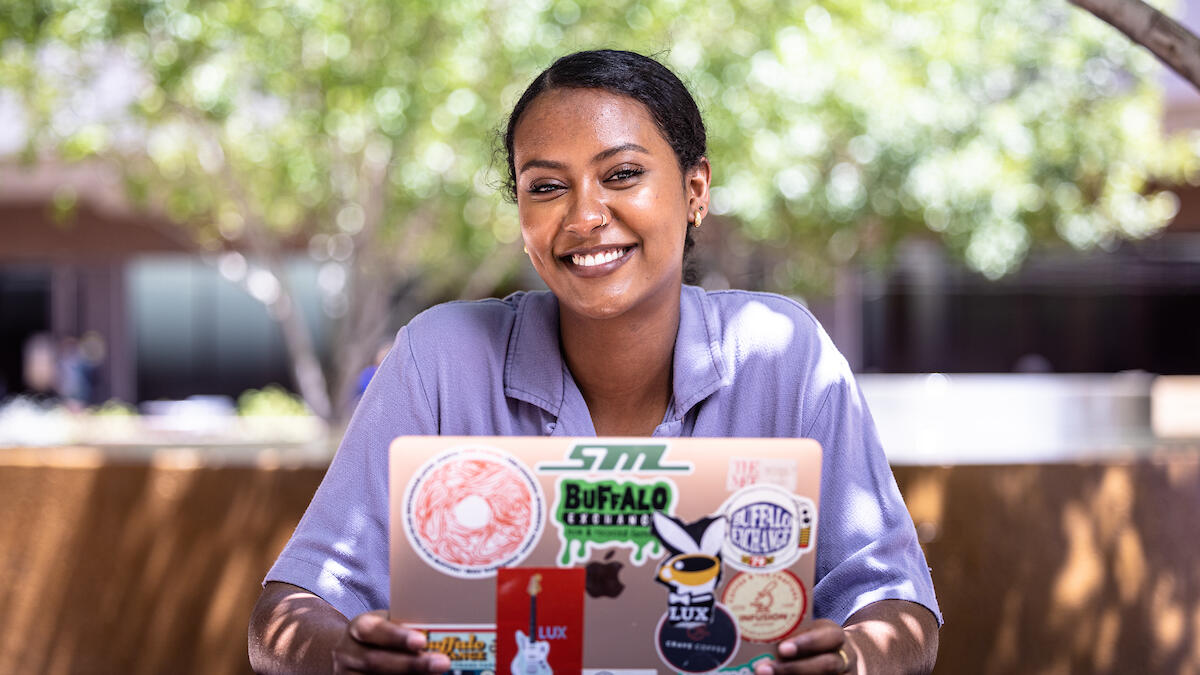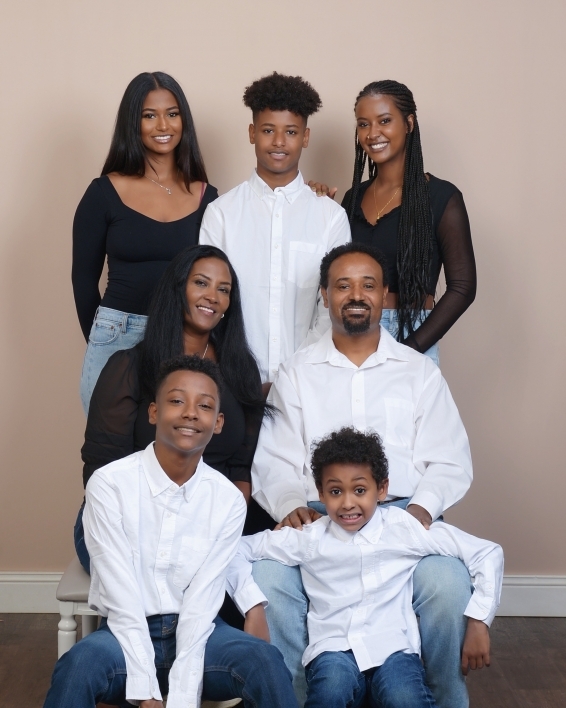Editor's note: This story is part of a series of profiles of notable spring 2022 graduates.
Distracted learning can be a problem for some college students — or a problem statement for Sabrina Mehari’s thesis study.
An ocean away from a conflict weighing heavy on her mind, Mehari, a Barrett, The Honors College student at ASU, took a detour from her studies in science and biochemistry to transform her distraction into an academic call to action for the international community to address the turmoil in Tigray. Ongoing since November 2020, the conflict in the northern region of Ethiopia is personal and real to Mehari, who spent three of her formative years living in a Tigrayan refugee camp before relocating to Tucson with her parents and younger siblings just over a decade ago.
As a non-native English speaker unfamiliar with the texts of international law and political science, the Eritrean-born Mehari admits she wasn’t “super confident” she could pull off a thesis on the topic, but after reaching out to ASU scholars Victor Peskin and Daniel Rothenberg — both instructors in the School of Politics and Global Studies — she did just that.
“Because she was not trained in international affairs, or political science or law, she wanted to learn and pursue several different paths of inquiry,” said Peskin, recalling his first meetings with Mehari in the summer of 2021. “She was interested in the crime of genocide, gender violence and how the Ethiopian government uses warfare and disinformation to perpetuate its war. Usually, if you are a political science major or global studies major, you're already taking these classes, so you're much more familiar. Sabrina took to the study in such an impressive way in a short period of time, which speaks to her devotion to her country and efforts to understand this terrible war and address it.”
Mehari said she chose to focus on Tigray for her thesis because the atrocities of the civil war between the Ethiopian government and Tigrayan forces just isn’t getting the media coverage it deserves. More than half a million people have died since the conflict began — Mehari’s uncle, a journalist who was covering the war, and several other relatives among them. With grim news trickling out of Ethiopia infrequently due to government restrictions on communication, Mehari said she found it difficult to focus on her biochemistry studies and lab work at ASU and decided to channel her emotional energy into her thesis.
Rothenberg said he was struck by how Mehari dealt with such a personal and emotional subject in a measured fashion. “She hadn’t been particularly engaged in these issues, and through this process, she started to reflect on her heritage and learned about a lot of things that are going on that are really terrible. With no background in this kind of work, she wrote a far better thesis, in my opinion, on political science and human rights issues than many of the students who studied this.”
Majoring in biochemistry, minoring in women and gender studies, and tackling a whole new area of study in international politics for her undergraduate dissertation, Mehari somehow found time to attend a rally in support of Tigray in Washington, D.C., in the fall of 2021, work in a research lab and support other students as a teaching assistant and member of the Ethiopian & Eritrean Student Association, the RISE Summer Leadership Institute and REACT — the Refugee Education and Clinic Team that works to address the health care disparities of refugee communities in the Phoenix area.
Passionately looking forward to beginning a career in medicine, Mehari has been shadowing a Phoenix-area doctor who has become a mentor, while preparing for her Medical College Admission Test. As for a possible future in politics or law after her thesis on Tigray, Mehari says she is not ruling that out either, and is exploring combined medical doctor-juris doctor programs to align her interests in medicine and law. Recalling her own mother giving birth in the refugee camp her family lived in in Tigray, Mehari says she would eventually like to go back to the region — and the same refugee camp — to help other women who may be in a similar situation.
Mehari is the first in her family to graduate from university. She is graduating summa cum laude from ASU’s Barrett, The Honors College on May 9.
Question: What was your “aha” moment when you realized you wanted to study the field you majored in?
Answer: I knew I wanted to pursue medicine coming into college and so I came in with a biomedical sciences major, but upon taking some chemistry classes, I realized that I loved learning about cellular processes and mechanisms, so I changed my major to biochemistry. My research lab where I study infectious diseases also allowed me to (apply what I was learning in my classes to real life), which further confirmed my love and appreciation for biochemistry.
Q: What is something you learned while at ASU – in the classroom or otherwise – that surprised you or changed your perspective?
A: I also minored in women and gender studies, and with every class I took, I was always shocked by how little women’s rights issues/policies have progressed over the years. We know so much more about the male body/cells than we do about women’s bodies and cells, and there is not a lot of active research to decrease this knowledge gap. I want to pursue women’s health and medicine to better understand the issues women all around the world face and be part of the process of expanding the research/field.
Q: Why did you choose ASU?
A: Living in Tucson at the time I chose ASU, I had a 2-year-old brother at the time and three other younger siblings, so I knew I wanted to stay in state and be near them. But I also wanted to be away from home to become more independent, so ASU was a great solution. I also really liked the structure and opportunities Barrett, The Honors College had to offer. Through the honor’s contract, I got to explore separate projects and make connections with professors.
Q: Which professor taught you the most important lesson while at ASU?
A: The most important lesson I learned has to be the importance of following my passion, and I learned this from my first semester chemistry professor Ron Briggs. I didn’t have the best experience with chemistry in high school, but when I took his class, I saw how much he loved teaching and how well he taught it. This inspired me to change my major and pursue my passion. If I do what I love, I’ll ultimately be great at it because I’ll always be motivated to improve.
Q: What is the best piece of advice you’d give to those still in school?
A: To make connections, network and don’t be scared to approach professors. I used to be super intimidated to approach professors or those ahead of me career-wise, but everyone I reached out to was eager to help and talk to me. All the amazing opportunities I have had are largely due to the connections I've made.
Q: If someone gave you $40 million to solve one problem on our planet, what would you tackle?
A: I am really devastated by the lack of international coverage and help Tigray has gotten in the past year-and-a-half. Tigrayans are at risk of perishing due to starvation and many other humanitarian crises, so I would allocate that money to feeding the millions starving in and around Tigray.
Top photo: Charlie Leight/ASU News
More Law, journalism and politics
Spring break trip to Hawaiʻi provides insight into Indigenous law
A group of Arizona State University law students spent a week in Hawaiʻi for spring break. And while they did take in some of the sites, sounds and tastes of the tropical destination, the trip…

LA journalists and officials gather to connect and salute fire coverage
Recognition of Los Angeles-area media coverage of the region’s January wildfires was the primary message as hundreds gathered at ASU California Center Broadway for an annual convening of journalists…

A new twist on fantasy sports brought on by ASU ties
A new fantasy sports gaming app is taking traditional fantasy sports and mixing them with a strategic, territory-based twist.Maptasy Sports started as a passion project for Arizona State University…






